Despite assurances to the contrary, the German episcopate as a body continues to be seen by many as plotting a course independent of Rome when it comes to questions about the sacraments, the priesthood and synodality. That said, several bishops have recently spoken out in defence of one topic which, certain circles claim, should be abolished if the Church is to change for the better: mandatory celibacy for priests.
 The main contribution, certainly in word count, comes from Bishop Dominikus Schwaderlapp, auxiliary bishop of Cologne, who wrote an article about the topic for the Tagespost (subsequently also published on Domradio), with a focus on the issue in the context of the abuse crisis. Identifying the call to abolish celibacy as conservative because it is, by now, a somewhat old-fashioned position, the bishop asks, “Why is my celibate way of life always criticised so strongly by people who don’t have to live it at all? Didnt I make that choice, not you?” He adds that no one forced him to choose to live celibate. Bishop Schwaderlapp explains the value of celibacy for a priest:
The main contribution, certainly in word count, comes from Bishop Dominikus Schwaderlapp, auxiliary bishop of Cologne, who wrote an article about the topic for the Tagespost (subsequently also published on Domradio), with a focus on the issue in the context of the abuse crisis. Identifying the call to abolish celibacy as conservative because it is, by now, a somewhat old-fashioned position, the bishop asks, “Why is my celibate way of life always criticised so strongly by people who don’t have to live it at all? Didnt I make that choice, not you?” He adds that no one forced him to choose to live celibate. Bishop Schwaderlapp explains the value of celibacy for a priest:
“It is not just a fitting oneself into the order of the Church. Celibacy is not limited to a – sometimes painful – denunciation of an exclusive two-way relationship of one’s own in order to have time and space for the many. And as such it is more than “just” the adoption of Jesus’ lifestyle – it is after all Him whom the priest is to make tangible in his life. Celibacy means a self-giving to Christ. with body and soul. And with and through Christ it means a self-giving to the people. It is about making the open heart of Jesus tangible through the celibate way of living. Being a priest is a matter of the heart, otherwise it becomes a caricature.”
The bishop likens this act of self-giving, which includes the priest sexuality, to what a husband and wife do in marriage. Rather than giving themselves to each other, with body, soul and sexuality, a priest gives himself to God.
Not blind to the challenges facing the Church and society, Bishop Schwarderlapp nonetheless concludes that allowing priests to marry is not an answer.
“This charism makes the purpose and mission of the priest “physical”: to make Jesus Christ visible, audible and tangible in this world. Incidentally, celibacy is always outdated because it refers, across time, to the one who was, who is and who will come. It is fatal if this charism is put up for discussion, and when we bishops take part in it. There are no new factual arguments against celibacy. [Abolition] would not serve as a remedy to abuse, nor as an impetus to the – much needed – inner renewal of the Church. There has never been renewal by less, but always only through more devotion.”
 Bishop Helmut Dieser of Aachen expresses himself in similar words. He too emphasises that celibacy is not something negative, nor something that is forced upon a priest. It is, he states, “a Biblical way of life in imitation of Jesus, a charism”. However, he also says, should a situation exist when there are no men choosing celibacy, the Church should keep “suitable married men” in mind. This openness to the practical situation, which at this time does not exist in Germany, is echoed by Bishop Stefan Oster of Passau. His position in an interview, which he shared on his website, caused some confusion as it appeared as if he was in favour of loosening the celibacy rules. “I am not, even when I consider it possible,” he tersely explains. Bishop Oster also explains that there is room to discuss the question of celibacy: “The question is not dogmatic. Unlike with sexual morality there is more leeway, and the pope has already encouraged the search for new ways in this regard.”
Bishop Helmut Dieser of Aachen expresses himself in similar words. He too emphasises that celibacy is not something negative, nor something that is forced upon a priest. It is, he states, “a Biblical way of life in imitation of Jesus, a charism”. However, he also says, should a situation exist when there are no men choosing celibacy, the Church should keep “suitable married men” in mind. This openness to the practical situation, which at this time does not exist in Germany, is echoed by Bishop Stefan Oster of Passau. His position in an interview, which he shared on his website, caused some confusion as it appeared as if he was in favour of loosening the celibacy rules. “I am not, even when I consider it possible,” he tersely explains. Bishop Oster also explains that there is room to discuss the question of celibacy: “The question is not dogmatic. Unlike with sexual morality there is more leeway, and the pope has already encouraged the search for new ways in this regard.”
About celibacy itself, the bishop says:
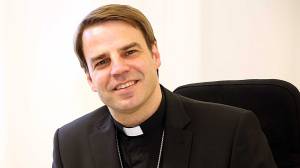 “Celibacy is the way of life of Jesus and as such a great spiritual treasure, which is worth fighting for. But I do not rule out the possibility (of a loosening of the celibacy rules). When the majority of priests say that it is no longer possible to live celibately in this time and society, then it becomes difficult. On the other hand I do not want the priest who is already struggling with his way of life, but who has made an oath, now reading, “the bishop also says that it is difficult, so I’ll also give it up.” I do not want to demotivate, I want to say: the struggle is worth it.”
“Celibacy is the way of life of Jesus and as such a great spiritual treasure, which is worth fighting for. But I do not rule out the possibility (of a loosening of the celibacy rules). When the majority of priests say that it is no longer possible to live celibately in this time and society, then it becomes difficult. On the other hand I do not want the priest who is already struggling with his way of life, but who has made an oath, now reading, “the bishop also says that it is difficult, so I’ll also give it up.” I do not want to demotivate, I want to say: the struggle is worth it.”
The new bishop of Fulda, Michael Gerber, who will be installed today, has also said that he is opposed to abolishing mandatory celibacy, and prefers to focus instead of assuring that priests remain part of a ‘network’, thus preventing any of them from falling prey to loneliness.
Other bishops, such as Peter Kolhgraf of Mainz and Georg Bätzing of Limburg, have expressed their support for voluntary celibacy, showing that, if anything, the German episcopate is no monolith.
Photo credits: [1] Erzbistum Köln, [2] Elisabeth Schomaker/KNA, [3] Bischöfliche Pressestelle Passau
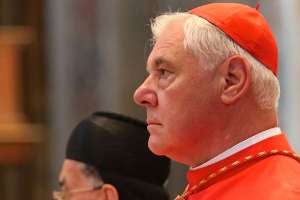 On Friday, Cardinal Gerhard Müller, former prefect of the Congregation for the Doctrine of the Faith and now a sort of free-roaming cardinal with no specific mission, issued a “
On Friday, Cardinal Gerhard Müller, former prefect of the Congregation for the Doctrine of the Faith and now a sort of free-roaming cardinal with no specific mission, issued a “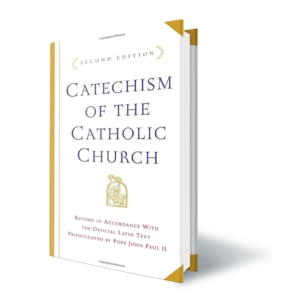 The manifesto is in the first place a summary of the
The manifesto is in the first place a summary of the  30 January: Alberto Cardinal Suárez Inda, archbishop emeritus of Morelia, Mexico
30 January: Alberto Cardinal Suárez Inda, archbishop emeritus of Morelia, Mexico In Belgium, Bishop Luc Van Looy of Ghent (pictured at left) has already had his retirement accepted. At 77, he completed a two-year extension to his mandate last year. He is to remain in office until the appointment and installation of his successor. Namur’s Bishop Remy Vancottem is, at 75, also past retirement age, so the southeastern diocese may see a new bishop before the year is out as well.
In Belgium, Bishop Luc Van Looy of Ghent (pictured at left) has already had his retirement accepted. At 77, he completed a two-year extension to his mandate last year. He is to remain in office until the appointment and installation of his successor. Namur’s Bishop Remy Vancottem is, at 75, also past retirement age, so the southeastern diocese may see a new bishop before the year is out as well. In October, the Synod of Bishops will gather again for a special assembly for the Pan-Amazonian region, to discuss the specific challenges for the Church there. The expectations are high, as many assume to what will be decided there, especially on the topic of married priests, will have global consequences. Participation in the special assembly is limited to bishops from the area, which means there is a minute Dutch link, at least when it comes to language, in the person of the bishop of Paramaribo, Msgr. Karel Choennie. Bishop Choennie is a member of the pre-synodal council preparing the special assembly in cooperation with Synod of Bishops’ general secretariat.
In October, the Synod of Bishops will gather again for a special assembly for the Pan-Amazonian region, to discuss the specific challenges for the Church there. The expectations are high, as many assume to what will be decided there, especially on the topic of married priests, will have global consequences. Participation in the special assembly is limited to bishops from the area, which means there is a minute Dutch link, at least when it comes to language, in the person of the bishop of Paramaribo, Msgr. Karel Choennie. Bishop Choennie is a member of the pre-synodal council preparing the special assembly in cooperation with Synod of Bishops’ general secretariat. (Life choices) The fundamental vocation resounding in the consciousness of every person is the appeal to life. “Choose life, then, that you and your descendants may live” (Deuteronomy 30:19). This fundamental choice to renew every day of our existence, gives rise to confidence; which in turn leads to openness to other and an engagement to serve the world. The appeal to life is the way of humanisation. You will have life “by loving the Lord, your God, obeying his voice, and holding fast to him” (Deut. 30:20). To the Christian this appeal to life is an invitation to be and become a disciple of Christ: Come and follow Me. The answer, given in full freedom, exists in conforming one’s life to that of the Christ: to develop trust in God, in prayer, love, joy, self-sacrifice… The appeal of the Lord presents a way of holiness.
(Life choices) The fundamental vocation resounding in the consciousness of every person is the appeal to life. “Choose life, then, that you and your descendants may live” (Deuteronomy 30:19). This fundamental choice to renew every day of our existence, gives rise to confidence; which in turn leads to openness to other and an engagement to serve the world. The appeal to life is the way of humanisation. You will have life “by loving the Lord, your God, obeying his voice, and holding fast to him” (Deut. 30:20). To the Christian this appeal to life is an invitation to be and become a disciple of Christ: Come and follow Me. The answer, given in full freedom, exists in conforming one’s life to that of the Christ: to develop trust in God, in prayer, love, joy, self-sacrifice… The appeal of the Lord presents a way of holiness.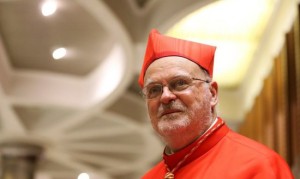 “It surprises me that the topic hasn’t been discussed that much. In Sweden, we have many mixed marriages. But most Catholics aren’t married to practicing Protestants. It is not an issue for us. Of course there are evangelical Christians who would like to receive Communion, but most are non-religious.
“It surprises me that the topic hasn’t been discussed that much. In Sweden, we have many mixed marriages. But most Catholics aren’t married to practicing Protestants. It is not an issue for us. Of course there are evangelical Christians who would like to receive Communion, but most are non-religious.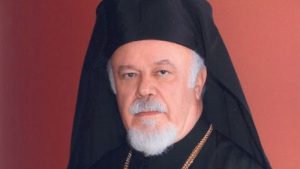 Greek-Orthodox Metropolitan Augoustinos, who hosted Cardinal Woelki in Bonn for the annual plenary meeting of the Greek-Orthodox Church in Germany, expressed himself in similar words after indicating that his church is also following the debate closely. He referred to the Orthodox principle of Oikonomia, which indicates that a regulation can be ignored or a rule broken when it serves the salvation of the person involved. But he then quoted Ecumenical Patriarch Bartholomew I, saying: “As soon as one defines the conditions under which Oikonomia can be applied, Oikonomia itself becomes a rule or regulation.”
Greek-Orthodox Metropolitan Augoustinos, who hosted Cardinal Woelki in Bonn for the annual plenary meeting of the Greek-Orthodox Church in Germany, expressed himself in similar words after indicating that his church is also following the debate closely. He referred to the Orthodox principle of Oikonomia, which indicates that a regulation can be ignored or a rule broken when it serves the salvation of the person involved. But he then quoted Ecumenical Patriarch Bartholomew I, saying: “As soon as one defines the conditions under which Oikonomia can be applied, Oikonomia itself becomes a rule or regulation.”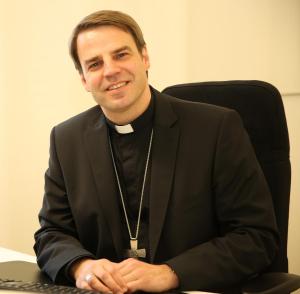 “It is right that we do not turn anyone away from the Communion bench. At that moment no judgement can be made about the discernment of conscience of the individual receiving. I can’t ‘expose’ anyone then. But when we take our understanding of the Eucharist seriously, there can be no superficial practice of giving Communion to just anyone. Therefore, as the priest giving Communion, I am obliged to offer people, at a suitable occasion, personal and spiritual guidance – and explain our understanding of the Eucharist more deeply. And yes, the praxis of individual pastoral care can indeed lead to singular and temporary situations. But in my opinion an official regulation of such exceptions can make it even more likely for such exceptions to become the rule. The current debate already shows that. It is basically less about the “serious spiritual need of individuals,” and more about the interdenominational marriages in general.”
“It is right that we do not turn anyone away from the Communion bench. At that moment no judgement can be made about the discernment of conscience of the individual receiving. I can’t ‘expose’ anyone then. But when we take our understanding of the Eucharist seriously, there can be no superficial practice of giving Communion to just anyone. Therefore, as the priest giving Communion, I am obliged to offer people, at a suitable occasion, personal and spiritual guidance – and explain our understanding of the Eucharist more deeply. And yes, the praxis of individual pastoral care can indeed lead to singular and temporary situations. But in my opinion an official regulation of such exceptions can make it even more likely for such exceptions to become the rule. The current debate already shows that. It is basically less about the “serious spiritual need of individuals,” and more about the interdenominational marriages in general.”
 Bishop Jan Hendriks, auxiliary bishop of Haarlem-Amsterdam, studies the matter in
Bishop Jan Hendriks, auxiliary bishop of Haarlem-Amsterdam, studies the matter in 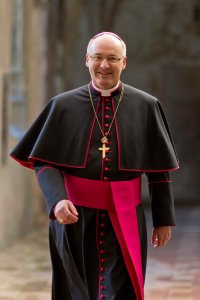
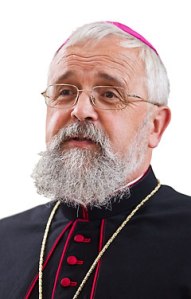 Opposing the actions of the seven bishops is Bishop Gerhard Feige, bishop of Magdeburg and president of the ecumenism commission of the German Bishops’ Conference. In a contribution to Der Zeit last Thursday, Msgr. Feige stated that not taking the chance to help people deepen the joy of the faith and their participation in the Eucharist, as well as promoting ecumenical encounters and strengthening the marriage bond would be “macabre and shameful”. Contrary to other bishops, Msgr. Feige insists that the pastoral outreach exists within modern theological and legal possibilities, referring to the canon law paragraphs which allow local bishops to decide under which circumstances non-Catholic can receive Communion. These circumstances, however, are emergency situations in which the danger of death and the unavailability of ministers of a person’s own denomination play key roles.
Opposing the actions of the seven bishops is Bishop Gerhard Feige, bishop of Magdeburg and president of the ecumenism commission of the German Bishops’ Conference. In a contribution to Der Zeit last Thursday, Msgr. Feige stated that not taking the chance to help people deepen the joy of the faith and their participation in the Eucharist, as well as promoting ecumenical encounters and strengthening the marriage bond would be “macabre and shameful”. Contrary to other bishops, Msgr. Feige insists that the pastoral outreach exists within modern theological and legal possibilities, referring to the canon law paragraphs which allow local bishops to decide under which circumstances non-Catholic can receive Communion. These circumstances, however, are emergency situations in which the danger of death and the unavailability of ministers of a person’s own denomination play key roles.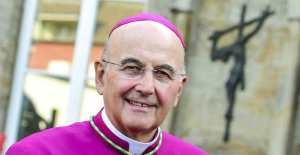 Münster’s Bishop Felix Genn is hopeful of finding a consensus. While the way in which the seven bishops expressed their difficulties with the conference’s vote did not make him happy, he understands their questions of conscience. In an interview for WDR radio Bishop Genn expressed his happiness about the way in which the standing council of the bishops’ conference discussed the issue last week. And although he would have preferred that the seven bishops had first informed the others about their letter before sending it, Bishop Genn’s attitude is perhaps the most consensus-minded in the delegation, which may be a reason for his inclusion. The bishop, for his part, simply thought of his mother’s motto when hearing about being included in the delegation: “One has never got enough work to do.”
Münster’s Bishop Felix Genn is hopeful of finding a consensus. While the way in which the seven bishops expressed their difficulties with the conference’s vote did not make him happy, he understands their questions of conscience. In an interview for WDR radio Bishop Genn expressed his happiness about the way in which the standing council of the bishops’ conference discussed the issue last week. And although he would have preferred that the seven bishops had first informed the others about their letter before sending it, Bishop Genn’s attitude is perhaps the most consensus-minded in the delegation, which may be a reason for his inclusion. The bishop, for his part, simply thought of his mother’s motto when hearing about being included in the delegation: “One has never got enough work to do.” In a recent interview for a documentary broadcast on Monday in Germany, Bishop Franz-Josef Bode of Osnabrück seemed rather ahead of events. The documentary discussed the future of the Church when there is a shortage of priests, and Bishop Bode spoke about the upcoming Synod of Bishops on the Amazon, scheduled for next year. One of the expectations for that Synod is that it will discuss the option of ordaining married men to the priesthood, as the shortage of priests is also a problem in the Amazon, where settlements are often few and far between, and faithful sometimes have to make do with one Mass per year. Ordaining married men would, the supporters of the idea, say, alleviate that problem, as it makes more men available for ordination. If there will actually be more men presenting themselves at seminaries remains a good question, though.
In a recent interview for a documentary broadcast on Monday in Germany, Bishop Franz-Josef Bode of Osnabrück seemed rather ahead of events. The documentary discussed the future of the Church when there is a shortage of priests, and Bishop Bode spoke about the upcoming Synod of Bishops on the Amazon, scheduled for next year. One of the expectations for that Synod is that it will discuss the option of ordaining married men to the priesthood, as the shortage of priests is also a problem in the Amazon, where settlements are often few and far between, and faithful sometimes have to make do with one Mass per year. Ordaining married men would, the supporters of the idea, say, alleviate that problem, as it makes more men available for ordination. If there will actually be more men presenting themselves at seminaries remains a good question, though.